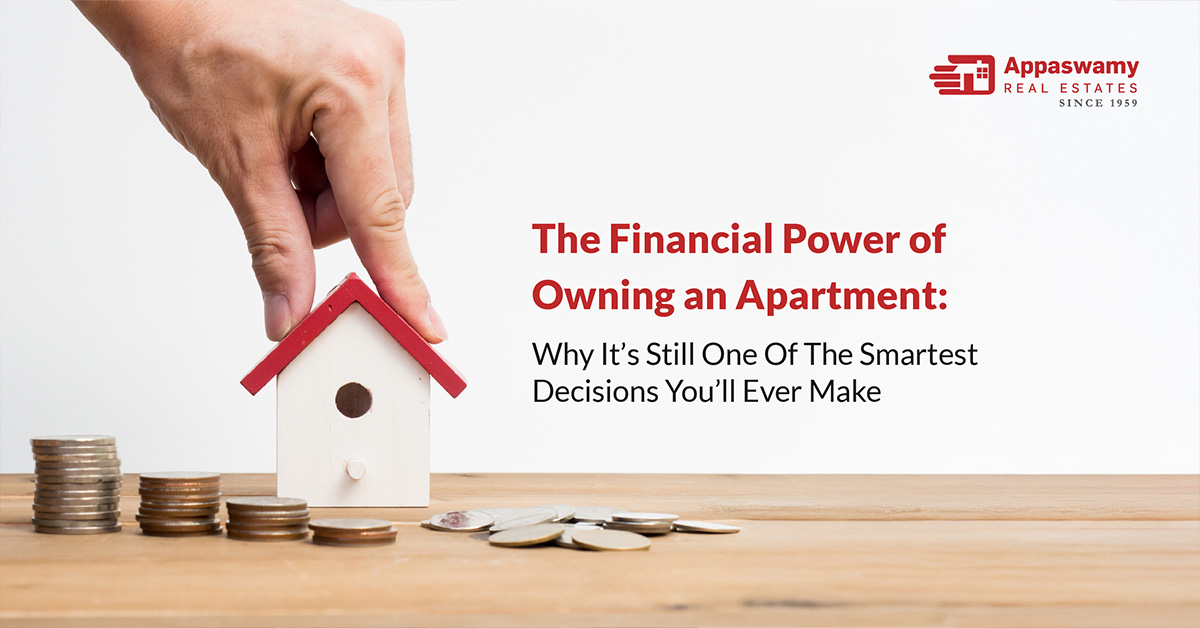
If there’s one investment that’s quietly, consistently built fortunes across generations, it’s not the latest tech stock or the next buzzy crypto project. It's something far simpler, more tangible, and often underestimated — real estate.
At Appaswamy Real Estates, we’ve spent decades watching homeowners create security, wealth, and even dynasties from a decision as simple as buying their first apartment. And no matter how flashy the financial world gets, ownership holds its ground — elegantly, steadily, without drama.
But why does buying an apartment still make so much sense, especially today? Let’s dive in.
1. You’re Buying a Growing Asset.
When you purchase an apartment, you don't pay just for a nice kitchen or a pretty view (though those don’t hurt). You’re investing in an asset that quietly gains value over time — without asking you to log into a dashboard every morning.
In key Chennai micro-markets like Adyar, Kotturpuram, and Velachery, residential property prices have grown at an average annualized rate of 8–12% over the past 15 years. This is disciplined , dignified appreciation. If you bought a ₹1.5 crore apartment today, you could reasonably expect it to be worth ₹4.5–5 crore in two decades — and that’s without any dramatic swings or lucky timing.
Meanwhile, you’re living in it. Enjoying it. Not staring anxiously at its “value” every day.
2. The EMI Story: How Smart Financing Turns You Into a Wealth Creator
Let’s talk about that three-letter word: EMI.
For a ₹1.5 crore apartment with an ₹80 lakh home loan at an 8.5% interest rate over 20 years, your EMI would hover around ₹69,000 per month. It feels like a heavy lift initially. But over time, something magical happens — your salary grows, inflation rises, and that ₹69,000 starts feeling smaller relative to your income.
Meanwhile, the real estate asset you’re paying for keeps appreciating.
In twenty years, you would have paid approximately ₹1.65 crore in EMIs. But you now own an asset that could be worth ₹4.5–5 crore. That’s a handsome net gain — and it comes from just living your life, paying your dues, and letting time do its thing.
Good luck finding another “monthly expense” that turns into such a significant asset without needing daily intervention.
3. Tax Benefits: One of the Few Times the System Smiles on You
Under the old tax regime, homeowners enjoy dual benefits: up to ₹1.5 lakh annually under Section 80C for principal repayment, and up to ₹2 lakh under Section 24(b) for interest on home loans. These deductions can significantly lower your taxable income, adding up to tangible yearly savings.
However, the game has changed with the new tax regime introduced in Budget 2025. The basic exemption limit has been raised substantially, up to ₹12.75 lakh, and with that, many traditional deductions (like 80C and 24(b)) are no longer relevant unless you're letting out your property.
So, what’s better? It depends on how your finances are structured:
For properties that are let out, interest deductions are still possible in both regimes, though principal repayments remain a benefit exclusive to the old one.
What does this mean in real terms?
Let’s just say, at certain levels of financial strength, this is one of the few investments where the system, quite literally, pays you back.
4. Rental Yield: An Income Stream That Grows While You Sleep
Once you own an apartment, it also subtly morphs into a potential income engine.
Chennai’s premium localities typically yield a 4.62% annual rental return on capital value, with 5–10% rental increases every couple of years. Not only does rental income create cash flow, but it also future-proofs you against inflation.
The longer you hold, the more attractive the rent relative to your original investment becomes. Over time, you could even use rental income to finance other purchases — like a second home, business investment, or international education for your children.
And yes, all while sleeping peacefully in your first apartment.
5. Collateral Value: Your Apartment Is a Silent Business Partner
Banks love real estate. It’s one of the few assets they’re truly happy to lend against.
Your fully or partially owned apartment can be used as collateral for personal loans, education loans, or business expansions. And because property is considered a relatively low-risk asset, you get better interest rates compared to unsecured borrowing.
In a world where liquidity is king, having a high-value asset on your side can open doors faster than you might think.
6. The Priceless Advantage: Stability and Control
Finally, and perhaps most importantly, owning your apartment anchors you.
No dealing with landlords who may suddenly decide they want their property back. No worrying about rent hikes every year. No limits on customising your home to suit your family’s needs — whether it’s a pooja room, a home theatre, or a balcony garden with 24 species of succulents.
Ownership turns the idea of "shelter" from something transactional into something transformative. It becomes your private world — one you can shape, secure, and pass on.
And in a fast-moving, high-noise world, that kind of rootedness is a strategy for living well.
Why Ownership Still Wins
Is ownership challenging sometimes? Absolutely. It demands planning, patience, and a little bit of number-crunching. Is it worth it? Without a doubt.
At Appaswamy, we’ve seen young professionals buy their first apartments and return two decades later to say, “Best decision I ever made.” We’ve watched families build legacies from a single bold step. We’ve seen markets rise, fall, and rise again — but home ownership, sensibly done, has always stood strong.
So if you’re weighing your next big move, remember, owning an apartment is a decision to bet on yourself, your future, and your peace of mind.
And it’s still one of the smartest bets you’ll ever make.
21 May 2025